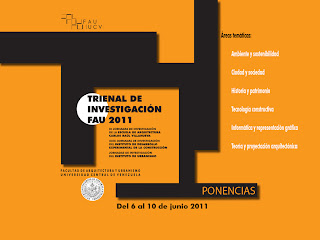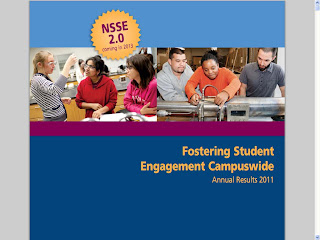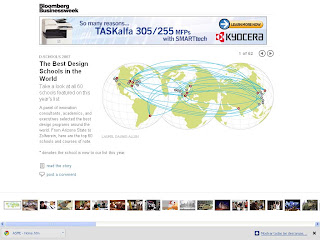Tuesday, 6 December 2011
Apoyemos a la Universidad Central de Venezuela
Monday, 28 November 2011
Investigación en Arquitectura Venezolana
 La investigación arquitectónica de calidad se abre camino en Venezuela. El vínculo lleva al sitio de la Trienal de Investigación de la Facultad de Arquitectura y Urbanismo de la Universidad Central de Venezuela, mi Alma Máter.
La investigación arquitectónica de calidad se abre camino en Venezuela. El vínculo lleva al sitio de la Trienal de Investigación de la Facultad de Arquitectura y Urbanismo de la Universidad Central de Venezuela, mi Alma Máter. Friday, 25 November 2011
Universal Design for Learning

- Present the students the subjects in multiple ways
- Allow them to express themselves in multiple ways
- Create multiple ways of engagement
Friday, 18 November 2011
Student Engagement
 Information on student engagement. It is done by the NSSE Institute for Effective Educational Practice of USA. At the end of the brochure there are some web sites very useful. You can tailor your own report with the Report Builder to hit the subject you want to measure.
Information on student engagement. It is done by the NSSE Institute for Effective Educational Practice of USA. At the end of the brochure there are some web sites very useful. You can tailor your own report with the Report Builder to hit the subject you want to measure. Thursday, 10 November 2011
¿Occupy Harvard?
Economic students walked out a class at Harvard in solidarity with the Occupy Movement. It is normal that the students, who are going to live gloomy lives thanks to it, feel uneasy with the promotion of principles that have cause current global crisis. But that is not that clear.
The faculty chosen as a target was professor N. Gregory Mankiw, a New Keynesian economist that advised George Bush and has written some of the most important text books on the subject. University politics are always unpredictable. Not so long ago, Harvard Crimson celebrated the return of former president Larry Summers, previously fired for sexism, and one of the main responsible for laissez-faire fever. Now, a Keynesian gets the punch. In a previous post (The responsibility of Number One) I compared the reaction of the London School of Economics and Harvard in front of ethically controversial cases. It's in Spanish here.
In spite all the trouble this event may cause, it is encouraging that Harvard students think that "Harvard students will not do that anymore. We will use our education for good, and not for personal gain at the expense of millions." Here is the link to the news by the Universtity of Phoenix and here by Harvard Crimson.
Tuesday, 8 November 2011
Dibujo del bueno
Sunday, 6 November 2011
Continuing Education Center

Friday, 4 November 2011
Joan Busquet Erasmus Prize

Friday, 28 October 2011
Social Media at University
 As I said in the post before, reality is way ahead institutions at the moment. The outburst of social media is obliging universities to regulate its use in campus. Interestingly enough, the first reactions from students have been complaining about censorship.
As I said in the post before, reality is way ahead institutions at the moment. The outburst of social media is obliging universities to regulate its use in campus. Interestingly enough, the first reactions from students have been complaining about censorship.Thursday, 27 October 2011
Reinventing Higher Education
¿Is education going to be reinvented by institutions or by people? Facts, like Kahn Academy, show that the acceleration of current life is leaving behind even the best educational institutions. The article in this link gives an idea of the real dimension of the problem. Anyway, IE University is making a great effort that benefits all.
Wednesday, 19 October 2011
Learning Revolution at Harvard
Mobile Learning
Saturday, 15 October 2011
The Thinking of Thom Mayne

Interesting lecture by architect Thom Mayne, at IAAC, Barcelona, yesterday. He talked about the “type of thinking” behind his works.
Through the lecture, he developed his point underlying certain “Non-Cartesian way of thinking” and also “thinking through things and not through words”. He illustrated his approach to thinking by celebrating things that are “always unique, never systematic”. In the case of the entrance to his extraordinary new building in China, the Giant Group Campus, the architect from Connecticut described it as “100% conceptual, completely useless, pure rhetorical”. Even, at a certain point, the 2005 Pritzker Prize resumed his whole life as a devotion to “not doing classical architecture”.
Ultimately, it sounded that Mayne, more than showing his way of thinking, showed the way he intensifies his beautiful forms by hiding the simple and extremely conventional way of thinking that lays behind his works. This slight contradiction, that does not devaluate a bit the immense quality of his work, is interesting for me, as I am working at the moment "How we think" by John Dewey in order to improve how we teach architecture. This contradiction just mentioned is assumed by Mayne himself: He emphasised that the “chassis” of his Cooper Union building in New York, was “incredibly simple”, and that this fact was completely hidden to the user through the concentration of the “encounters of different things” in its extremely sophisticated hall.
Sunday, 9 October 2011
The Architecture Film Festival of Rotterdam

From 6 to 9 October the LantarenVenster cinema in Rotterdam on Wilhelminapier is the epicentre of the 6th Architecture Film Festival Rotterdam (AFFR). For four whole days film and architecture devotees can indulge themselves with a programme packed with shorts and feature films, documentaries about glamour architects, debates, talk shows and excursions.
Saturday, 8 October 2011
Wrong Things with Education
Friday, 7 October 2011
Zenithal Light (Sonia Álvarez)



Former student, Architec Sonia Álvarez, from R3 Arquitectura, has published on the Web this design done by her at our 2007 LAR Workshop at IE University. I agree with Sonia that this two weeks work is one of those works that resists the pass of time.
2007
ALUMNA: Sonia ÁLvarez
PROFESOR:
Dr. Arq. Miguel Jaime
DESCRIPCIÓN DEL EJERCICIO:
La definición más elemental de arquitectura siempre incluirá a la luz. Por su parte, la luz cenital es la relación entre la luz y el espacio más primaria, ya que naturalmente la luz (del sol, la luna, las estrellas) viene desde arriba. En el presente ejercicio se pide iluminar cenital y naturalmente un espacio de usos múltiples de 40,00 m X 12,00 m de planta y de 12,00m de alto, con su cara más corta orientada a norte. La altura libre resultante después de cubrirlo influirá directamente en la versatilidad del espacio, como es lógico.
Wednesday, 5 October 2011
Reflexive Organizations

A learning system… must be one in which dynamic conservatism operates at such a level and in such a way as to permit change of state without intolerable threat to the essential functions the system fulfils for the self. Our systems need to maintain their identity, and their ability to support the self-identity of those who belong to them, but they must at the same time be capable of transforming themselves. (Schon 1973: 57)The link has a good and comprenhensive information on Schön's learning approach.
Monday, 3 October 2011
Reflexiveness and Artificial Intelligence
 The base of reflexive learning is on Dewey's work. Artificial Intelligence (A.I.) and machine learning could be a natural development if we take into account "How we Think", the marvellous book written by Dewey in 1910.
The base of reflexive learning is on Dewey's work. Artificial Intelligence (A.I.) and machine learning could be a natural development if we take into account "How we Think", the marvellous book written by Dewey in 1910.Tuesday, 20 September 2011
Space, Time and Beauty at Piacenza

A good way of reaching global scale in architecture and urban planning is by designing in one of the most beautiful towns in the world, Piacenza, Italy.
Tuesday, 30 August 2011
Learning in the Digital Age

Wednesday, 3 August 2011
Plot Against America

An excellent reading for this summer: "The plot against America", by Philip Roth. It opens our imagination on what could have happened as well as what could happen in the future.
Tuesday, 12 July 2011
Dean's Opinions
The variety of opinions of the deans of the schools of architecture invited in Segovia demonstrate that education is at a difficult crossroads. I wished someone had talked about learning and not just education.
Sunday, 26 June 2011
Architectural Education Summit

Thursday, 9 June 2011
How Designers Think

Sunday, 1 May 2011
Design Education Research
The importance of Design Education Research for design educators is perfectly described by Erik Bohemia at the last paper of this interesting conference:
"it is imperative in these taxing times that design educators continue research their educational practices and the assumptions underpinning these practices. The reason for this is so that they will be able to respond to the changes described above with informed knowledge. This means that they will be able to (re)design curriculum in order to incorporate "desired" changes and/or to "preserve" elements that are deemed important to produce a relevant design education."
Friday, 29 April 2011
Social Web and Learning
Wednesday, 27 April 2011
The Best Design (Business) Schools

Sunday, 24 April 2011
Design, Beauty and Fidelity


At the Disseny Hub Barcelona, there is still (hurry up, it's ending soon) two wonderful exhibitions.
One of them is the Maria Brillas collection of dresses designed by couturier Pedro Rodriguez in the 1930-1980. Fortunately, the collection will remain at the Barcelona Textile Museum as it has been donated by its owners.
A look at the dress in the first picture is enough to get an idea of the artistry trapped in those amazing pieces. It was design in 1935. At first glance, it is just a lovely flounce dress, in nice colours it is true, but just that. Once you stare at it more closely, you realize that the shadows of the flounces are actually done in a different fabric. Those violet streeps under the flounces reinforce the “shadow effect”, whenever there is in fact shadow under them, and they create “shadow illusions” in the waist of the dress, when it fits the body to enhance Doña Maria’s beautiful figure. Brillas wore it, for the first time, 40 years after it was elaborated at the 80th anniversary of Rodriguez (second picture). That is fidelity.
The other exhibition is the Mediterranean Design Prizes. Interesting to see what our young designers think the image of the Med should be today and how they present it. The winner is a typographic project by an Italian designer done with natural products, like tomatoes, anchovies and so on. Don't miss it either.
Tuesday, 19 April 2011
Corrupción Inocente

Thursday, 14 April 2011
La crisis sigue siendo política, no económica

El "Casino Capitalism" lo desataron los políticos: Reagan fue el que dio el pistoletazo de salida de la desregulación y Clinton, con su brazo económico Summers, la puntilla. Bush consagró la política del goteo (hay que dejar que los ricos ganen más para que sus fortunas permeen hacia abajo). Pero no hay que olvidar los respectivos congresos, los cientos de representantes del pueblo que discutieron, redactaron y aprobaron la rendición de la política a la especulación financiera. Ahora, en estos precisos momentos, la dimensión política de la situación creada enturbia incluso el juego limpio económico tal como lo expone Stiglitz en su artículo "Jugar con el planeta":
"En los últimos años hemos visto dos de los grandes riesgos, pero hemos hecho poco para controlarlos. Según algunas personas, la forma en que se manejó la última crisis puede haber aumentado el riesgo de un colapso financiero en el futuro.
Los bancos demasiado grandes para quebrar y los mercados en los que participan saben ahora que pueden esperar rescates si tienen problemas. Como resultado de este riesgo moral, esos bancos pueden pedir créditos en condiciones favorables, lo que les da una ventaja competitiva que no se basa en un rendimiento superior, sino en la fuerza política"
Tuesday, 12 April 2011
Thursday, 7 April 2011
New Architectural Thinking: ¿When?
The Institute for the New Economic Thinking is a good example of what we should be doing in architecture.
Monday, 4 April 2011
Looking for Today's Roosevelt

If you are a politician and would dear to pronounce a speech like this today: please, launch yourself.
Franklin Roosevelt’s Address, October 1936
"We had to struggle with the old enemies of peace–business and financial monopoly, speculation, reckless banking, class antagonism, sectionalism, war profiteering.
They had begun to consider the Government of the United States as a mere appendage to their own affairs. We know now that Government by organized money is just as dangerous as Government by organized mob.
Never before in all our history have these forces been so united against one candidate as they stand today. They are unanimous in their hate for me–and I welcome their hatred."
The whole speech is in the link.
Wednesday, 30 March 2011
New Winds from the South
 From 8th to 10th of June in Frotaleza, Brazil this interesting conference on the young architecture of Latin America. Creativity in the near future is going to blow from that part of the world too. The link has more information
From 8th to 10th of June in Frotaleza, Brazil this interesting conference on the young architecture of Latin America. Creativity in the near future is going to blow from that part of the world too. The link has more information
Sunday, 6 March 2011
Responsabilidad de los Nº 1

“ Hoy el Congreso ha votado a favor de actualizar las normas que rigen los servicios financieros desde la Gran Depresión y reemplazarlas con un sistema apto para el siglo XXI. Esta ley de dimensiones históricas ayudará a las empresas estadounidenses a competir mejor en la nueva economía”
Monday, 21 February 2011
Architectural Pedagogy Conference


 Next week there is going to take place at Princeton this conference. It seems that architecture is so self-satisfied with its success in the era of money bubbles that ignores its responsibilities in what is happening.
Next week there is going to take place at Princeton this conference. It seems that architecture is so self-satisfied with its success in the era of money bubbles that ignores its responsibilities in what is happening.A great contribution to overcome current crisis from the architectural world could be improving its pedagogy and therefor traditional teaching. What a pity.








